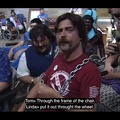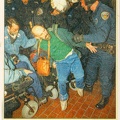Mainstream Magazine, April 1993 issue
[This article continues in ADAPT 1974, but is included here in its entirety for easier reading.]
Photo: Wade Blank, in sneakers, jeans and an ADAPT T-shirt over a long sleeved shirt, walks with other ADAPTers in a march down a city street. Beside him is George Roberts, behind George is Diane Coleman and behind her is Anita Cameron. Behind Wade's left side is Chris Hronis, and behind him Bill Henning carries a banner.
Caption for picture reads: Wade Blank takes to the streets of San Francisco with ADAPT in October 1992
Title: Wade Blank,
1940 to 1993
Co founder of Adapt [sic] Pursued A Vision Of Justice For People With Disabilities
By Laura Hershey
When a college friend dared Wade Blank to march with Martin Luther King. Jr. in Selma, Alabama. Wade didn't know what to expect. However, the experience imbued him with a vision of civil rights which he would never forget. Later. working in the youth wing of a nursing home, he understood clearly that the same issues, freedom. equality, and justice, were at stake for people with severe disabilities. Throughout his life, Wade Blank strove to obtain independent living opportunities and equal access for people who had lone been denied these basic civil rights.
Wade died at age 52 on Feb. l5. I993. in a swimming accident in Todos Santos, Mexico, where he was vacationing with his family. He was trying to save his 8 year old son. Lincoln. An undertow made the
rescue impossible; both Wade and Lincoln drowned.
Wade is survived by his wife, Mollie; his daughter. Caitlin, 6; and his adopted daughter, Heather, 22, who has a disability. All members of the Blank family were actively involved in the disability rights movements that Wade helped launch.
On Feb. 2l. a memorial service drew 1,100 people to Denver's Radisson Hotel. the site of the first national
protest by American Disabled for Accessible Public Transit, or ADAPT. the grass roots, direct action
disability rights movement Wade co-founded.
Wade and Lincoln were remembered as spirited, loving people committed to social change. A neighbor remembered Wade helping her fix a broken lock late one night; she recalled Lincoln leading other children in a rousing chant during a make-believe demonstration on his front porch. Wade's colleague Shel Trapp quipped. “lf Heaven is inaccessible. God is in big trouble."
Wade believed in the leadership potential of even the most severely disabled activists. He pushed his followers to take charge of the movement, even when it would have been easier to dominate it himself.
His ability to alternate between a directive role and a supportive role from manager to attendant. from
mentor to messenger kept Wade close to his people. lt also had a tactical value: At a 1991 demonstration
in Colorado. police were vainly searching for someone to hold responsible for several dozen unstoppable wheelchair wielding protesters. An officer asked Wade. “Are you in charge here?"
"No." Wade answered. “I just help people go to the bathroom."
Drawing on his background as a pastor of a diverse and active parish, Wade taught the value of community. He brought people together across disabilities, classes, races, ideologies and other differences. ln ADAPT. Wade created a true community. welcoming anyone committed to the movement's vision of justice. During national actions, people from across the country exchange experiences and expertise. offer each other encouragement and strength, meet friends and even start romances.
Just getting to the sites of national protests requires enormous energy expenditures and a myriad of
logistical details for people with disabilities, many of whom use wheelchairs. On long. grueling caravan
drives across country. Wade met those needs with humor and gentleness. He drove tirelessly, navigated, did attendant care, pumped gas, made fast food runs, hauled suitcases and battery chargers, repaired wheelchairs, even brought coffee to everyone’s rooms in the mornings. When we grew exhausted and short-tempered. he buoyed us with affectionate teasing and terrible, recycled puns. He kept the troops moving, both on the road and during protests. with encouragement, bad jokes. and calm confidence.
Protests will be tougher without Wade's bold creativity, irrepressible sense of humor, and reassuring presence. But the movement won’t die with Wade. He knew that. “King‘s organization’s mistake was that they hung it all around his neck,” he told an interviewer last November. “What happened to the movement? It lost its definition. King gave it its definition. If I would get knocked off tomorrow or die of a heart attack, it wouldn’t slow us down a bit. We know what we’re about, and the movement would go on with the same intensity.”
In 1971, Rev. Wade Blank arrived in Denver after 10 years of preaching and organizing in the Midwest. He had graduate degrees in divinity and was an ordained Presbyterian minister. But his radical activities had gotten him in trouble with the church authorities and he had been fired from his parish. His experiences had included hosting meetings of the Kent State chapter of Students for a Democratic Society (SDS); helping Vietnam War draftees flee to Canada; and organizing African American youths to demand community water and sewage systems in conservative Twinsburg Heights, OH.
Wade was burned out and not sure what he wanted to do next. He ended up at Denver’s Heritage House nursing home, where he tried to make institutional life bearable for young disabled people. He quickly
realized that such confinement could never be acceptable. He was fired from his job, but stayed in
touch with several of the young residents. Eventually he helped 11 of them move into their own apartments.
At first, Wade himself provided all his clients’ attendant care, until finally the State of Colorado agreed to fund home health care services for people living independently. This was the beginning of the Atlantis Community (named for a forgotten continent), today a thriving independent living center in Denver.
Even in their newly won freedom, the Atlantis founders discovered barriers to independence all around them. Public buses were inaccessible, so the community members became activists. One July 5, 1978, with Wade’s support and guidance, 19 disabled people blocked buses overnight in the busy intersection at Colfax and Broadway to demonstrate their demand for lifts on buses. Protests continued until, in June 1983, Denver committed itself to a fully accessible bus system.
Last summer, the city laid a plaque at the Colfax-Broadway intersection, engraved with the 19 activists’ names. Characteristically downplaying his own key role in the demonstration, Wade asked that his name not appear on the plaque.
Wade once described his role this way: “That’s what my job is, to assist my people in gaining the power to make change." Throughout his years of service to “my people,” Wade worked to build strength and leadership among disability activists.
Emboldened by success, the Denver activists carried their demands for bus access to the entire nation. Wade‘s vigorous encouragement and organizing skills had helped to transform a group of powerless
nursing home "patients" into a band of effective revolutionaries. Now that same savvy spirit found a warm reception among disabled people who were tired of segregation and exclusion. A new movement was born, with the fitting acronym ADAPT, or American Disabled for Accessible Public Transportation. The first national ADAPT protest took place at the Radisson in October, 1983. The nation's transit officials were meeting at the hotel when disabled protesters blocked every entrance.
Similar demonstrations throughout the country, involving the blocking of hotels, office buildings, and buses, focused public attention on the fact that access to transportation was a basic civil right denied to people with disabilities. Subsequent protests refined ADAPT ’s brand of protest. With his 1960s civil rights experience, Wade taught his followers how to stage protests that were non violent but direct and confrontational. In the hands of people with severe disabilities, these tactics were astonishingly effective. ADAPT activists baffled police officers, and filled jail cells, in dozens of cities. The public, and ultimately the powers that be, had to respond. The idea of people with severe disabilities, and their allies (including Wade), risking arrest again and again some as many as 20 or 30 times proved not only impressive, but persuasive.
After nearly a decade of such protests, ADAPT achieved its goals for the nation’s transit systems. The Americans with Disabilities Act (ADA) included mandates for bus and rail services. All new bus purchases must now be lift equipped, just as Wade and his cohorts had demanded.
But before it passed, the ADA became stalled in the U.S. Senate and was in danger of being defeated or weakened by amendments. Wade organized a “Wheels of Justice” campaign that included three days of marching, demonstrating, and civil disobedience. Some 150 people were arrested in the Capitol rotunda. Within a few weeks, the ADA passed the full Senate, and was signed into law by President Bush on July 26, 1990.
But Wade and ADAPT spent little time celebrating. They knew there was still much to be done. With over a million people still languishing in nursing homes, ADAPT immediately launched its new campaign, demanding the shifting of federal Medicare/Medicaid funds from nursing homes to in home attendant services that would allow people disabled by birth, accident, illness, or age to live independently. The meaning of the acronym, ADAPT, did just that it adapted. The letters now stand for American Disabled for Attendant Programs Today. The old battle cry, “We Will Ride!,“ was replaced with a new one: “Free Our People NOW!”
In a recent interview, Wade said, “My whole commitment in life is to eradicate those nursing homes, to destroy them, bring them down. We will.” He didn’t live to see that goal realized, but he shared that vision with hundreds of others. In the process he helped create a movement that will continue the fight to “Free Our People.”
Laura Hershey, freelance writer and poet, is an ADAPT activist.
Inserted in box: A memorial will be held May 9, I993 at the Lincoln Memorial as part of an ADAPT action in Washington DC.
Contributions may be sent to The Family of Wade Blank Memorial Fund at The First National Bank of Denver, 300 S. Federal Blvd., Denver, CO 80206.
A trust fund has also been established in the name of Wade Blank. Contributions can be sent to Atlantis/ADAPT
c/o Evan Kemp, 2500 Q St. N.W I21,
Washington, DC 20007.
- Author
- Mainstream Magazine, by Laura Hershey
- Created on
- Wednesday 24 July 2013
- Posted on
- Wednesday 9 October 2019
- Tags
- Anita Cameron, Bill Henning, Chris Hronis, civil rights, Diane Coleman, drowned, George Roberts, Laura Hershey, Lincoln Blank, Selma, Todos Santos Mexico, Wade Blank
- Visits
- 478
- Rating score
- no rate
- Rate this photo


0 comments